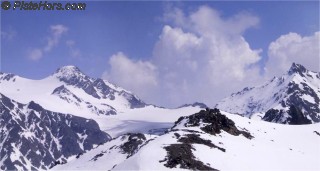Val Thorens Tarps Glacier
Local ski instructor Philippe Martin summed up the problem “This map, it is 20 years old, you see all these areas marked as glaciers, come back this summer and you will see they are gone”. Val Thorens may be the highest ski resort in Europe but even its lofty summits and twinkling glaciers are suffering from the changing climate. The resort is fighting back. From the spring of 2008 the Savoie resort, on the edge of the Vanoise National Park, plans to cover part of its glacier with a giant tarpaulin.

Glaciers at Val Thorens, snow covered, but for how long?
Importing an idea that has already been tried on the glaciers of Switzerland and Austria the lift company, the SETAM (société d’exploitation des téléphériques Tarentaise-Maurienne) wants to cover part of the Glacier de Thorens under the col chair with a reflective white film. The tarpaulin will be installed when the lifts close in May and removed in the Autumn to enable the glacier to benefit from early snowfall.
First a bit of history. Val Thorens was developed by the ski promoter Pierre Schnebelen. Schnebelen had taken over running the lifts at Tignes in the 1960s. His secret to stabilizing Tignes’ finances was summer skiing on the Grande Motte glacier. This encroached onto France’s first national park created a few years earlier but a quick redrawing of the borders solved that problem. This horrified France’s nascent environmental movement who thought of Schnebelen as the Antichrist. With summer skiing on the Grande Motte and over at Val d’Isère on the more limited Pissalais it was now possible to run the resorts in both summer and winter.
The local authorities were developing the resort of les Menuires in the Belleville valley. They had hoped to weave the same magic as it Courchevel. Indeed the resort was a key to developing the whole Three Valleys ski area. However they had underestimated the problems and costs of building on the area’s difficult geology. A solution seemed to be the creation of a satellite resort at the head of the valley. Val Thorens. Given the area’s potential for glacier skiing Schnebelen was brought in. He suggested equipping the Chavière Glacier. The plan was to “attract a rich, international clientele” with two direct flights per day from Paris. Things immediately started to get complicated. The Chavière Glacier was in lands belonging to a village in the Maurienne valley. They demanded their own ski resort, Val Chavière (perhaps not ideal for marketing in the 21st century?), with access from the Maurienne and jobs for the locals. The resort would be in the heart of the Vanoise national park.
In June 1971 the campaigners won a partial victory. Plans for Val Chavière were scrapped but permission was given for four surface lifts. Two were eventually built. The 1992 Albertville Winter Olympics relaunched plans for Val Chavière. Six lifts and 1600 vertical meters of skiing. On the 23rd of April 1989 four hundred people climbed to the glacier on touring skis to form a giant, human ‘NO’. Under the full glare of the media the Environment Minister agreed. The surface lifts stopped running and their rusting remains were finally removed in 2002.
Val Thorens persisted with summer skiing on the Peclet glacier. During the 1970s other areas including Tignes, Les Deux Alpes, l’Alpe d’Huez, la Plagne and Bramans (Col du Sommeiller) in the Maurienne all offered summer skiing. Bramans closed in the 1980s, its glacier in rapid retreat. Very little of the ice field now remains. Val Thorens followed in 2001 and the ski lift on the Peclet was removed in 2003, it no longer conformed with EU regulations. Since then la Plagne and l’Alpe d’Huez have followed suit. Only Tignes, les Deux Alpes and Val d’Isère have, more or less, resisted. Tignes says that summer skiing will cease within the next decade due to glacier retreat. Val d’Isère reopened its glacier last summer after the controversial installation of snow canons but closed the area rapidly due to a heatwave. Rumours are that les Deux Alpes will shift its summer season earlier and no longer remain open to the end of August. All three of these ski areas are watching the Val Thorens experiment with interest.
The aim of the 750m2 cover, a bit bigger than a football pitch, is to assure skiing around the top of the Col chair without resorting to snow making and extensive piste preparation and terracing. However the Vanoise National Park must agree. Their decision is expected over the summer. Too late to go ahead this year. The material is water porous but reduces melting by 60%. Local guides and instructors seem to be in favour of the cover. They hope it will maintain access to the off-piste routes of the Gebroulaz and the Pointe de Thorens. Environmental groups are less enthusiastic seeing it as a further artificialization of the mountain environment. The CIPRA (Commission Internationales pour la Protection des Alpes) has accused ski resorts of being in denial about climate change.
Further Information
The Effects of Global Warming on Skiing
Posted by
davidof on Tuesday, 19 June, 2007 at 04:22 PM
I am amazed that the French ski resorts have not spent more money protecting their remaining Summer glaciers. The rarer they become, the more they will be able to charge for their usage.
Any chance of viewing Philippe Martin’s 20-year-old map online? Would be interesting to see a then-and-now comparison.
Posted by
Whitegold on Wednesday, 27 June, 2007 at 02:38 PM
Val Thorens has decided to not to cover its glacier next summer. A study carried out for the resort showed that the area covered was too small to be effective.
Posted by
davidof on Tuesday, 31 July, 2007 at 03:20 PM
Page 1 of 1 pages
Comments are now closed

